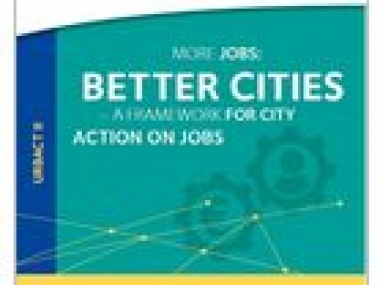More Jobs: Better Cities - A Framework for City Action on Jobs
Edited on
09 February 2015How to help cities support and grow more and better jobs for the recovery? This is the key challenge tackled by the paper "![]() Download URBACT II Capitalisation: Cities of Tomorrow, Action Today - Better cities, a framework for city action on jobs (1.75 MB)" part of a series of six new URBACT thematic reports "Cities of Tomorrow: Action Today". Written by Mike Campbell and Alison Partridge, this report provides a framework for city action on jobs. It can be used as a tool to review and develop existing approaches, stimulating a rethinking of city action and providing advice and guidance to policy-makers and practitioners.
Download URBACT II Capitalisation: Cities of Tomorrow, Action Today - Better cities, a framework for city action on jobs (1.75 MB)" part of a series of six new URBACT thematic reports "Cities of Tomorrow: Action Today". Written by Mike Campbell and Alison Partridge, this report provides a framework for city action on jobs. It can be used as a tool to review and develop existing approaches, stimulating a rethinking of city action and providing advice and guidance to policy-makers and practitioners.

The report "More Jobs: Better Cities - A Framework for City Action on Jobs" is aimed at practitioners and policy-makers at the city level, as well as those at national and international levels, concerned with urban employment and skills policy and practice. It sets out a whole system approach, a strategic, coherent, systematic and integrated means of creating more and better jobs.
Challenges and Opportunities
With more than 25 million people unemployed, or more than one person in ten, and with 18 million new jobs required to reach the Europe 2020 employment rate objective of 75%, the jobs agenda is a top priority across the European Union. More than two-thirds of the European Union’s workforce live in cities and one in four people lives in just 40 agglomerations of more than one million people.
"There can be no European solution to jobs without a cities solution. Cities are the main engines of growth, competitiveness, innovation and jobs. But some cities’ jobs performance is strong, while others' is weak.Cities all need to do better if we are to achieve our employment ambitions.", the authors explain. They add "And yet we are in turbulent times. The economic crisis has been followed by a period of economic and fiscal austerity and recovery is slow. This not only means that creating more jobs is highly necessary, it is also extremely difficult."
"We need to adapt to changes and to take a new approach to the jobs challenges cities face, a systematic, coherent approach for these new times. This is why we have developed this framework for city action on jobs, a whole system approach to help cities make a real difference and be more successful in generating more and better jobs for their people in the years ahead."
The Framework For City Action on Jobs
All cities are different to some degree in the problems they face, the opportunities they have as well as the resources and powers available to them. There is no 'one size fits all' solution. But many cities also have much in common.
The framework is a set of principles, a structure, which provides support, guidance and ideas that can be adapted and used in most situations. It is a tool box that can be used to review existing approaches and develop new ones. Above all it is developed to help rethink what we do, and what we could do, to generate new jobs initiatives.
The paper asserts that cities need to address three broad sets of issues – jobs and the economy, people and the labour market, and the connections between them (such as governance, intelligence and capacity) – to achieve economic recovery, growth and resilience. It examines each of these in turn and includes examples from a wide range of cities, projects and organisations.
According to the authors of the paper “How things are done is as important as what we do. We need to fit together all the pieces of the jobs jigsaw in a systematic and coherent way across the institutions in the city."
The framework for city action on jobs, people and connections, taken together with the changes in economic conditions and fiscal austerity, also means that the capacity and capability of city institutions are key to success. This entire agenda requires effective leadership – political, business and organisational.
And to conclude "Cities can make a real difference. Achieving success will not be easy but using this framework can help cities meet the challenge of creating more and better jobs for their citizens."
Read more:
Submitted by admin on
